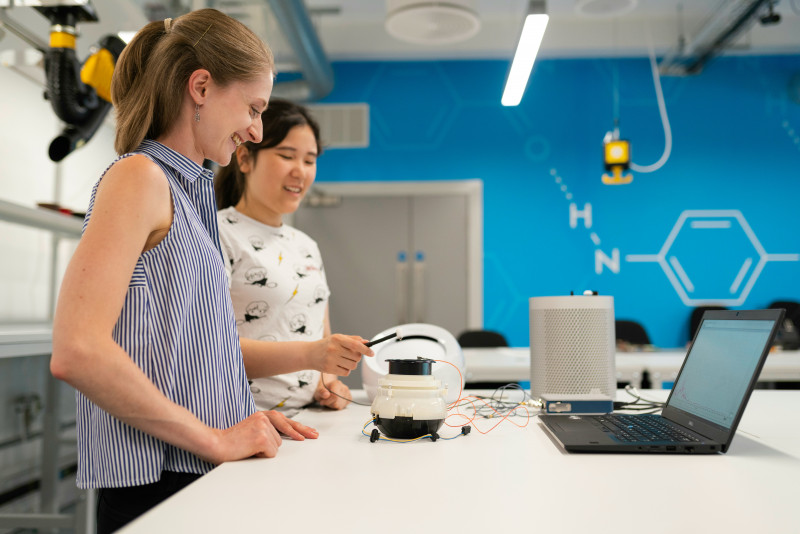Scotland is a tech nation so we should seize the opportunities ahead
I spoke in a debate today about innovation and advancement - we need to embrace sustainable technology too if we are to have a liveable future.

As we navigate our way to a fairer and greener Scotland, we know that technology will be an important tool for us as we tackle the grand challenges we face.
So we must not only embrace technological innovation and advancement, but also ensure we are aligned – closely – with Europe’s forward-thinking approach to sustainable innovation.
Because of course, technology, in and of itself, is not always a good thing.
We must make sure, as I discussed in the Green Economy debate on Wednesday, that our innovations, processes and techniques support our vision for a liveable future.
We know that many in Scotland have worked hard to earn our reputation as a hub of technological development.
Excellent innovation infrastructure, spotting and exploiting opportunities, and a highly skilled workforce have all contributed to this.
Digital businesses in Edinburgh and Glasgow, for example, have a combined turnover of £1.2bn, employing more than 70,000 people.
And of course, tech is in the DNA of Dundee, one of the cities I am honoured to represent.
Britain’s “coolest little city” is, according to Tech Nation, one of the most likely cities to become a leading UK tech hub, with its vibrant mobile application, software and games development scene.
But Brexit uncertainty, lack of adequate or appropriately targeted UK Government capital investment, skills development and talent retention remain challenges for the sector – across Scotland – to overcome if it is to continue to thrive well into the future.
Because we will need tech – including AI – to meet the challenges we face. As we embrace the transformative opportunities tech provides, we must ensure that our technological progress aligns with principles that protect the planet, promote social sustainability, and foster a circular economy.
The Scottish Greens’ vision for Scotland as a technology nation extends beyond economic considerations; it encompasses the principles of green industrialism and the imperative to create a technology landscape that protects people and planet.
In emphasising a "repair economy", we echo the sentiments of those who want to end the cycle of discarding perfectly good devices.
We envision a Scotland where repair, reuse, and recycling are not only encouraged but become integral to our tech culture.
The goal is to move away from a throwaway culture, from built in obsolescence, where it's cheaper to buy new devices than to repair the ones we already love. In doing so, we not only protect our environment but also create thousands of jobs in a burgeoning repair economy.
The principles articulated by the European Commission resonate strongly with our vision for a sustainable tech future here in Scotland: our tech innovations must solutions for rather than a be a barrier to the sustainable green economy.
Given some of the growth predictions in different tech sectors, our commitment to green industrialism demands that we take proactive measures to ensure the growing environmental footprint won’t have a negative impact.
So, to harness technology for good and protect the planet, we should work toward the following goals:
Consumers should have the right to repair their own devices or choose paid repair services. This will empower us to extend the lifespan of their devices, promoting sustainability and reducing e-waste.
Empowering people to make informed and sustainable retail choices is crucial. Labels should indicate the environmental impacts of technology. This will empower everyone to consider the ecological footprint of their gadgets.
We should set strong minimum sustainability requirements – as far as devolved powers allow – including considerations for reparability and product longevity, across all products on the market. This would ensure that manufacturers prioritise eco-friendly design and durability. Efficiency standards, currently industry-led across the UK, set a good precedent for this.
We should promote a "repair economy" supported by strategic investments in creating a secondary market for reusing raw materials. This not only contributes to environmental conservation and material optimisation but also generates new job opportunities in the repair and recycling sectors.
Developing a skills-based labour market and encouraging skills transferability in the context of the circular transition aligns with the goal of creating a workforce capable of supporting sustainable practices. This initiative promotes adaptability and expertise in environmentally friendly technologies.
Aiming for zero harmful substances in our technology is a pivotal commitment tied to the goals of the Circular Economy. Eliminating or minimising harmful materials in the production and disposal of technology is essential for creating a less polluting and more sustainable industry.
And the UK Government obviously has a role to play in all this.
We need to enhance transparency and commercial reporting on the environmental impact of technology, including greenhouse gas emissions, energy consumption, and life-cycle impacts, to be published in an open database. This information empowers consumers and policymakers to make informed choices.
Integrating environmental impacts as decision-making criteria in developing public policies for the purchase and use of digital equipment is critical. By aligning policies with sustainability goals, all governments in the UK can actively contribute to shaping a more eco-conscious tech landscape.
Scotland should align with 2030 EU targets for a significant reduction in the use of materials and incorporating the climate impact of technology in upcoming laws and regulations on AI.
These proposals collectively represent a comprehensive strategy to integrate sustainability into the technological landscape, ensuring a more environmentally conscious future.
As we celebrate the strides made in Scotland's tech sector, let us weave these principles into the fabric of our technological advancement.
Because Scotland can be a beacon, not just in technological prowess, but in embracing technology that protects the planet, fosters social sustainability, and champions a circular economy.
Together we can build a future where technological innovation and socio-environmental stewardship go hand in hand.

